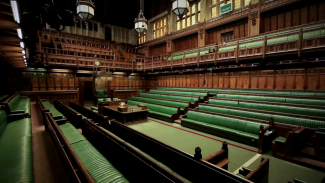Coalition calls for an inclusive Parliament

A coalition of organisations including STAMMA is calling for Parliament to be more inclusive of people with communication differences.
Parliament can be a hostile place for those who stammer. The way debates in the House of Commons work means that speakers are at risk of being talked over, interrupted or mocked if they show any sign of disfluency or struggle with their speech.
Earlier this year, we shared the horrendous experience of Chris Nelson, who withdrew his candidacy to become MP of Kettering after experiencing mockery and hateful comments directed at his stammer by political colleagues.
Today, 3rd December, is United Nations' International Day of Disabled Persons, and to mark the occasion, over 30 organisations including STAMMA and the Royal College of Speech & Language Therapists will make a submission to the House of Commons' Modernisation Committee. The Committee is a parliamentary body that has been set up to review and improve the way debates are conducted within Parliament, and they are looking for input on what they should prioritise. We will use this highlight how people with communication differences like stammering can feel excluded and how to improve their procedures. If you want to find out more, read the coalition's statement in full below.
You can get involved too. The Committee is inviting anyone to make a submission, so we encourage you to visit its website to have your say on why you think change is needed. The Committee is accepting submissions until 3pm on 16th December 2024. You can make your submission via this link on the Modernisation Committee's website.
Statement by the Inclusion Parliament Coalition in full
To mark the United Nations' International Day of Persons with Disabilities (3 December), a coalition of over 30 organisations is calling for the United Kingdom Parliament to be inclusive of signers and people with communication disability, difficulty, or difference.
The theme of this year's International Day of Persons with Disabilities is amplifying the leadership of persons with disabilities for an inclusive and sustainable future. That makes our call for an inclusive Parliament especially timely because currently signers and people with communication disability, difficulty, or difference can face barriers engaging with Parliament and with the political process more generally.
This can affect parliamentarians, staff on the parliamentary estate and in constituency offices, people seeking elected office, and members of the public trying to engage with their MPs. It can affect the ability of people of all ages to engage with the democratic process, ranging from children and young people, including disabled children and young people, to adults with life-long, or acquired, conditions.
MPs and members of the House of Lords who sign or have communication disability, difficulty, or difference can face added barriers to participation. This is because they do not enjoy the protection of the Equality Act with its requirement to make reasonable adjustments. This is exacerbated by so much of parliamentary business being time-limited and needing to be delivered verbally, including sometimes the use of specific wording.
To help deliver the change we want to see, the inclusive Parliament coalition will be making a submission to the House of Commons' Modernisation Committee's call for views.
We will be setting out what we think needs to happen so that the Commons' standards, culture and working practices, and parliamentary procedures are accessible to and inclusive of signers and people with communication disability, difficulty, or difference.
- We will be asking the Committee to work with us, and with signers and people with communication disability, difficulty, or difference, to make Parliament accessible and inclusive. We will be making immediate, practical recommendations that can be enacted right now, while longer-term action is undertaken.
- We will also be asking the Committee to consider whether current standards, culture and working practices, and parliamentary procedures are compliant with the United Nations Convention on the Rights of Persons with Disabilities, specifically Article 29 on participation in political and public life.
We also encourage signers and people with communication disability, difficulty, or difference to make a submission to the Committee themselves highlighting why they think change is needed. The Committee is accepting submissions until 3pm on 16 December 2024.
This statement is supported by the following organisations:
Afasic
Ambitious About Autism
ASLTIP
Auditory Verbal UK
BATOD
British Deaf Association
British Dyslexia Association
Bury People First
CICS (Cochlear Implanted Children's Support Group)
Disabled Children's Partnership
Down's Syndrome Association
Headlines Craniofacial Support
Include.org
Mikey's Wish Foundation
NAPLIC
National Association for Hospital Education
National Deaf Children's Society
NatSIP
NDTi (National Development Team for Inclusion)
Royal College of Occupational Therapists
Royal College of Speech and Language Therapists
SAPHNA
SMiRA
Speakeasy
Special Needs Jungle
Speech and Language UK
Speech Bubbles
Square Peg
STAMMA
The Co-op
The Michael Palin Centre
Total Communication Services CIC
Voice21

































